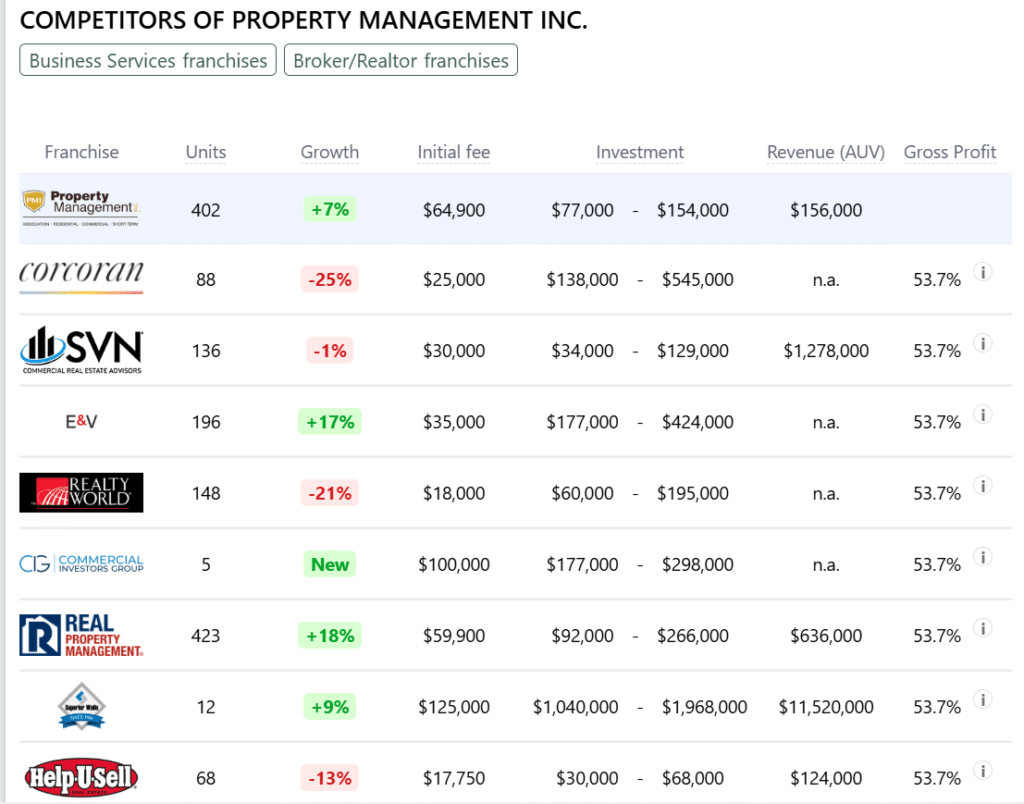Property Management Inc. Franchise FDD, Profits & Costs (2025)

Property Management Inc. (PMI) is a distinguished leader in the diverse field of property management. Founded in 2008 and headquartered in Lehi, Utah, PMI quickly positioned itself as a major player by offering comprehensive property management services across four key sectors: residential, commercial, association, and short-term rental management.
This broad spectrum of services allows PMI to cater to a wide range of property management needs, making it a unique presence in the industry.
The company began franchising the same year it was established, reflecting its robust business model and the high demand for skilled property management. PMI’s franchise model is particularly attractive due to its multi-pillar approach, which allows franchisees to diversify their services and revenue streams.
Initial Investment
How much does it cost to start a Property Management Inc. franchise? It costs on average between $77,000 – $154,000 to start a Property Management Inc. franchised facility.
This includes costs for office setup, technology systems, licensing, and initial operating expenses. The exact amount depends on various factors, including the size and scope of the property management services offered, the location, and whether the franchisee chooses to lease or purchase office space.
| Type of Expenditure | Amount |
|---|---|
| Franchise Fee | $64,900 to $90,000 |
| Rent | $0 to $2,000 |
| Rental improvements | $0 to $2,500 |
| Deposits | $0 to $2,500 |
| Pillar Certification Training Program, Workshop, and PMiLAUNCH | $0 to $3,800 |
| Equipment and Business Supplies | $500 to $3,000 |
| Computer hardware and software (as required) | $675 to $2,975 |
| Local Advertising expenses for a period of 3 months | $4,500 to $13,500 |
| Insurance | $2,000 to $5,000 |
| Professional services | $0 to $2,000 |
| VOIP Telephone Equipment (3 months) | $300 to $500 |
| Additional funds for period of 3 months | $3,864 to $25,000 |
| Initial Trust Account deposit for Short-Term Rental operations | $500 to $1,000 |
| Existing Property Management Company (EPMC) | – |
| Total | $77,239 to $153,775 |
Average Revenue (AUV)
How much revenue can you make with a Property Management Inc. franchise? A Property Management Inc. franchised location makes on average $156,000 in revenue (AUV) per year.
Here is the extract from the Franchise Disclosure Document:

This compares to $320,000 yearly revenue for similar broker/realtor franchises. Below are a few Property Management Inc. competitors as a comparison:

Download the Franchise Disclosure Document
Frequently Asked Questions
How many Property Management Inc. locations are there?
As of the latest data, Property Management Inc. operates a total of 402 units, all of which are franchised. The company does not own or operate any company-owned units.
What is the total investment required to open a Property Management Inc. franchise?
The total investment required to open a Property Management Inc. franchise ranges from $77,000 to $154,000.
What are the ongoing fees for a Property Management Inc. franchise?
For a Property Management Inc. franchise, the ongoing royalty fee is 7% of gross revenue. In addition, franchisees are required to contribute 1% of their gross revenue toward national marketing and advertising efforts. These fees support continued brand development, operational support, and promotional campaigns to help drive business to each franchise location.
What are the financial requirements to become a Property Management Inc. franchisee?
To become a Property Management Inc. franchisee, candidates are typically required to have a minimum net worth of $100,000 and at least $25,000 in liquid capital. These financial requirements help ensure that franchisees have the necessary resources to cover startup costs and sustain operations during the initial stages of the business.
How much can a Property Management Inc. franchise owner expect to earn?
The average gross sales for a Property Management Inc. franchise are approximately $0.16 million per location. Assuming a 15% operating profit margin, $0.16 million yearly revenue can result in $24,000 EBITDA annually.
Who owns Property Management Inc.?
Property Management Inc. franchise is owned by Steve Hart, who is also the founder and CEO of the company.
Disclaimer
Disclaimer: This content has been made for informational and educational purposes only. We do not make any representation or warranties with respect to the accuracy, applicability, fitness, or completeness of the information presented in the article. You should not construe any such information or other material as legal, tax, investment, financial, or other professional advice. Nothing contained in this article constitutes a solicitation, recommendation, endorsement, advertisement, or offer to buy or sell any franchises, securities, or other financial instruments in this or in any other jurisdiction in which such solicitation or offer would be unlawful under the franchise and/or securities laws of such jurisdiction.
All content in this article is information of a general nature and does not address the detailed circumstances of any particular individual or entity. Nothing in the article constitutes professional and/or financial and/or legal advice, nor does any information in the article constitute a comprehensive or complete statement of the matters discussed or the law relating thereto. You alone assume the sole responsibility of evaluating the merits and risks associated with the use of any information or other content in this article before making any decisions based on such information or other content.




